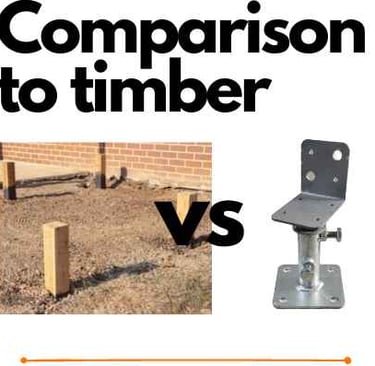Dowd Adjustable Deck Support vs. Timber Stumps: Navigating Your Deck Support Options
Decks are an integral part of outdoor living spaces, providing a perfect spot for relaxation and entertainment. When it comes to supporting your deck, the choice between Dowd Adjustable Deck Supports and traditional Timber Stumps can be perplexing. In this article, we'll delve into the pros and cons of each option, guiding you through the decision-making process.
Dowd Adjustable Deck Support
Dowd Adjustable Deck Support offers a modern alternative to traditional deck support methods. With its innovative features, including height adjustability and easy installation, Dowd Hardware provides homeowners with a versatile and reliable option for deck construction.
Features and Benefits of Dowd Adjustable Deck Support
Dowd stands out for its ability to adapt to various terrains, ensuring a stable foundation for your deck. The ease of adjustment simplifies the leveling process, making it an attractive option for DIY enthusiasts. Additionally, Dowd supports eco-friendly practices by using sustainable materials in its construction. Click here for the Dowd Adjustable Deck Support
Pros and Cons of Dowd Adjustable Deck Support
Pros:
Height adjustability for uneven surfaces
Easy installation, suitable for DIY projects
Environmentally friendly materials
Save time with labour costs
Durability of hot dipped galvanised steel. Will outlast timber
Cons:
Initial cost may be higher than traditional options
Limited aesthetic options compared to timber stumps
Timber Stumps
Traditionalists often turn to Timber Stumps for their deck support needs. This time-tested method involves using timber posts as the primary support structure for the deck. While it may lack the adjustability of Dowd, timber stumps have their own set of advantages.
Traditional Approach to Deck Support
Timber stumps have been a staple in deck construction for decades. Their durability and reliability make them a popular choice for homeowners seeking a more traditional aesthetic for their outdoor spaces.
Advantages and Disadvantages of Timber Stumps
Pros:
Natural and rustic appearance
Cost-effective compared to some adjustable options
Cons:
Limited adjustability for uneven terrain
Installation may require professional assistance
Susceptible to environmental factors like rot and pests
Mis-cuts can be costly
Stability and Adjustability
Dowd excels in providing stability on uneven surfaces, thanks to its adjustable design. Timber stumps, while robust, may pose challenges on sloped or irregular terrains.
Installation Process
Dowd's simple installation process caters to DIY enthusiasts, offering a quicker setup. Timber stumps, on the other hand, may require professional assistance for precise and secure installation.
Environmental Impact
For eco-conscious homeowners, Dowd's use of sustainable materials may be a deciding factor. Timber stumps, while natural, are subject to environmental concerns related to deforestation and treatment processes.
Cost Considerations
While Dowd may have a higher initial cost, its long-term benefits and DIY-friendly installation can contribute to cost savings over time. Timber stumps may be more cost-effective initially but could incur higher installation costs.
Meeting Individual Preferences
Dowd's range of design options allows homeowners to express their creativity. From elevated decks to multi-level structures, Dowd adapts to various design aspirations.
Customisation Options
Timber stumps, while classic, may lack the design flexibility. Dowd's customisable features enable homeowners to create a deck that suits their lifestyle and complements their property.
Long-term Considerations
Considering the long-term durability of your deck support is crucial. Dowd Hardware's use of sustainable materials and adjustable design factors in longevity, contributing to a more robust investment over time.


Contact
Business Hours
Pickup and viewing by appointment only.
Call to arrange an appointment.
Morning, afternoon or night. We are flexible with times
